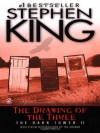Red Dead Reademption
Currently reading
Who else is out there?
I'm looking for more people to follow who are into fantasy and science fiction. I've gone through BookLikes' explore feature, but I thought I'd ask and see if anyone had anybody fun that they follow that are primarily into these genres.
Thanks!

I've been fascinated with North Korea for a while, now, and this book is one of the reasons why. I happened across it in my Friendly Neighborhood Comic Shop, and the simple art style immediately grabbed my attention. I flipped through it, read a couple of pages, and bought it.
Pyongyang: AJINK chronicles animator Guy DeLisle's sojourn in the hermit kingdom as he works on an animated series forced to relocate production due to budgetary constraints. The art is simple and elegant, which is appropriate, given the creator's profession, and the prose reflects and complements the art, with a dry, sometimes understated wit that underscores exactly how alien North Korean culture can seem to outsiders.
It's a fast read, which is understandable given the format, but it's an engaging one. DeLisle's sense of humor is readily apparent (he reads Orwell's 1984 while he's there), but while he pokes fun at the bombast of the regime (such as damning the International Friendship Museum with faint praise in the guestbook he signs), he never denigrates the people who must live under it. In fact, when he notices a man filling his shirt with apples from the tree outside his window, he feels a pang of guilt that he's been gaining weight since he arrived (the food is terrible and soaked in oil; a fact verified by Vice.tv's Shane Smith in the Vice Guide to North Korea) while this guy clearly is trying to augment his diet anyway he can.
It's also clear that DeLisle only sees what he is allowed to see. He is shown many monuments and impressive examples of the DPRK's proud Juche' ideals, but he's only allowed to see two subway stations (opulent though they are). When he goes back to the subway on his own, he's surprised to find that the stations he was barred from are just simple subway stations. His excursion causes him a bit of trouble, as he is not actually allowed to travel without his guide and translator. Other cracks in the North Korean facade are readily apparent; while he stays in a luxury high rise hotel, only one floor has electricity and is occupied.
Overall, it's a great read, and well worth picking up. If It's a great companion book to Vice.tv's Vice Guide to North Korea. The crew stays at the same hotel as DeLisle, so you'll recognize the poor sea turtle in the lobby.
A Human Story
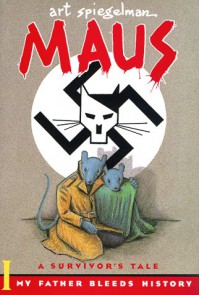
I've started this review several times, and I can't seem to find the words to describe Maus' impact on me personally, and the impact it had on the graphic novel as art. It tells an important story, but its power comes from how the story is told; it wouldn't be nearly as effective as a simple prose novel.
Art Spiegelman (one of the artists who brought us Garbage Pail Kids; true story) tells the story of his father Vladek's experience during the holocaust using an effective visual metaphor: Jews are mice; Germans are cats. Americans, when they appear, are dogs. Admittedly, the metaphor breaks down the further you get from the source material (Spiegelman himself admits this in the text; cutaways to the present sometimes show him wearing a mouse mask), but it clearly illustrates the imbalance of power that typified the Holocaust.
The visual style is simple but bold. Thick black lines lend a starkness to the work that evokes the bleakness of Vladek's experiences. The characters are drawn simply, with an economy of line that adds to their humanity rather than distracts from it; the simpler they are drawn, the more of themselves the readers can project onto the maus protagonists.
Spiegelman tells his father's story simply, beautifully, and honestly. Despite the metaphors (or perhaps because of them) he masterfully captures the raw humanity of the players on both sides of the story, and deftly shows that even though portrayed as a metaphor of cat and mouse writ large, the protagonists and antagonists alike are still terrifyingly human.
 I've yet to listen to a David Sedaris audio book that I didn't like. I'm not sure reading them would have the same effect; reading of Sedaris' travails in a speech therapy class would not be the same as listening to him read them with the ghost of the lisp that landed him there lurking constantly at the edges of his speech. His conversational tones add a sense of the casual and commonplace to even the most surreal anecdote. Listening to him read of his father's jazz combo dreams for his children have a charm and simplicity that the printed word, for all its versatility, simply lacks. As always, Sedaris is witty, often darkly funny, and piercingly insightful. He is often more poignant that one would expect, writing of his sisters, parents, and brother with both affection and humor. This one, along with "Me Talk Pretty One Day," is in constant rotation on the iPod.
I've yet to listen to a David Sedaris audio book that I didn't like. I'm not sure reading them would have the same effect; reading of Sedaris' travails in a speech therapy class would not be the same as listening to him read them with the ghost of the lisp that landed him there lurking constantly at the edges of his speech. His conversational tones add a sense of the casual and commonplace to even the most surreal anecdote. Listening to him read of his father's jazz combo dreams for his children have a charm and simplicity that the printed word, for all its versatility, simply lacks. As always, Sedaris is witty, often darkly funny, and piercingly insightful. He is often more poignant that one would expect, writing of his sisters, parents, and brother with both affection and humor. This one, along with "Me Talk Pretty One Day," is in constant rotation on the iPod.
The Regulators
 Dammit. I had a pretty lengthy review and then lost it. Oy.
Dammit. I had a pretty lengthy review and then lost it. Oy.I liked it. Desperation's moodier and more atmospheric; this one is more fast-paced and gory, but over all it's a fast read and a fine novel. Desperation deals with the darker sides of human nature and the universe, while The Regulators deals with the human psyche in stressful situations. If Desperation is Lovecraft, The Regulators is Bloch.
Overall it reads like a fast paced (if gory) supernatural adventure story, with occasional lulls that explain the backstory and events leading up to all hell breaking loose.

I did not care for this book at all. Holden Caulfield is an asshole. I just can't empathize with a protagonist that I keep wanting to punch in the throat. I spent the entire book waiting for someone to shoot him. Really. I don't even know why, I just kept thinking "Motherfucker gonna get SHOT" and then nothing. The pimp encounter was entertaining, yet not nearly enough physical punishment was doled out to Holden Caulfield to make it in any way satisfying. I had to read this at the college level. I turned in a paper on The Grapes of Wrath instead. Also this book killed John Lennon.
OK, that last part's not true. I didn't actually turn in a paper on The Grapes of Wrath.
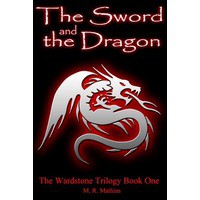 Amazon suggested this based on a Dalglish book I downloaded. Gave it a try, got a few chapters in, and got bored. Just really kind of meh. Nothing grabbed my attention, nothing really stood out. Despite the stellar reviews, I'd file this one with Eragon. Same treatment of standard fantasy tropes. Don't know if I'd call it bad, but it definitely bored me to the point of not wanting to read farther, so take that as you will.
Amazon suggested this based on a Dalglish book I downloaded. Gave it a try, got a few chapters in, and got bored. Just really kind of meh. Nothing grabbed my attention, nothing really stood out. Despite the stellar reviews, I'd file this one with Eragon. Same treatment of standard fantasy tropes. Don't know if I'd call it bad, but it definitely bored me to the point of not wanting to read farther, so take that as you will.The opening scene is lackluster, at best, and just kind of jumps around, constantly keeping us at the periphery even though we are inside the characters' heads. Farm boys (or tribesmen, actually, but eh, same difference) are climbing cliffs to harvest eggs that they sell. The eggs provide such a significant portion of their income (clearly they rely on consistent egg harvests) that I begin to wonder why none of the tribe at all have thought to, I don't know, build some scaffolding, or permanent handholds, or something to maybe make the whole enterprise less dangerous. Maybe some guardrails. The reader is left wondering if the danger is perhaps due to the climb posing some barbaric rite of passage, but unfortunately the reason seems to simply be "because artificially contrived tension, that's why!" so we're never enlightened, and are forced to assume that this society is comprised of nothing but idiot man-children. A ring is found, an egg hatches, and the most boring prophecy ever is rattled off like it ain't no thang. Also elves are mentioned.
It reminded me so much of Eragon, in fact, that I felt that if I was going to read a trite knockoff of Eragon, I might as well just read Eragon.
Tl;dr: just read Eragon. Paolini's a lot of things, but he's not boring.
 It's Conan the Cimmerian. Pulp adventure at it's finest. Not having read at least a few of these stories is like not having read the Lord of the Rings. You gots to establish your street cred, son!
It's Conan the Cimmerian. Pulp adventure at it's finest. Not having read at least a few of these stories is like not having read the Lord of the Rings. You gots to establish your street cred, son!
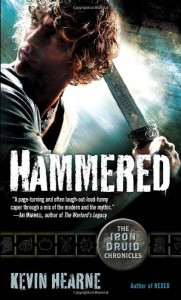 Just like the previous two, I could not put this one down. Very fast read, very interesting take on theology, and the Mythological Justice Friends that get together to take on a god is a mythology geek's wet dream. Oberon remains my favorite character (sorry Atticus).
Just like the previous two, I could not put this one down. Very fast read, very interesting take on theology, and the Mythological Justice Friends that get together to take on a god is a mythology geek's wet dream. Oberon remains my favorite character (sorry Atticus). The prose is tight, fast paced, and sweeps you from scene to scene with barely a chance to catch your breath, in the very best pulp adventure tradition. Hearne's Arizona is as vividly realized as Butcher's Chicago, even if the strokes it's painted with are broader, which is fitting for the setting.
Desperation
 King at the height of his freaky weirdness. Pretty much had me hooked from the first page with the roadsign. Nice exploration of divine interference, pre-determination, and supernatural chessmasters.
King at the height of his freaky weirdness. Pretty much had me hooked from the first page with the roadsign. Nice exploration of divine interference, pre-determination, and supernatural chessmasters.King's prose is, well, King. He paints vivid pictures and distinct characters. Desperation keeps a tone of unsettling creepiness from the beginning to the end, and while not sleep-with-the-lights-on scary, parts are very unsettling, in a facing-the-darkness-within kind of way. Looking forward to the Bachman companion novel next.
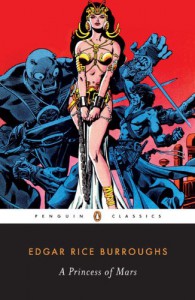 Classic sword-and-planet, which is fitting, because this book pretty much created the genre. Arguably, this is Burroughs at his best, even though it was his first. The Burroughs tropes are all here: a man's man outsider protagonist winning the respect of a barbarian culture; noble warriors of said barbarian cultures joining the Man's man protagonist in glorious combat; breakneck action; Dejah Thoris (who is pretty much a trope in and of herself).
Classic sword-and-planet, which is fitting, because this book pretty much created the genre. Arguably, this is Burroughs at his best, even though it was his first. The Burroughs tropes are all here: a man's man outsider protagonist winning the respect of a barbarian culture; noble warriors of said barbarian cultures joining the Man's man protagonist in glorious combat; breakneck action; Dejah Thoris (who is pretty much a trope in and of herself).If they seem cliched, it's because this story started them all. Tarzan never made it to Barsoom, and John Carter never made it to Tarzan's Africa, but either would have been just as easily at home in each other's story as they were in their own.
Burroughs' Barsoom is as fully realized as Howard's Hyborea and Lovecraft's Arkham. The culture of the Tharks is easily as intricate as that of any fictional aliens from more modern franchises.
And Woola kicks ass.
 Solid meh. It kept me reading, but it really is Star Wars in Middle Earth. Not a bad selection for someone studying Joseph Campbell; this plus Star Wars are textbook examples of the Monomyth, but there's not a lot to set it apart from the rest of the pack. Elves are perfect, dwarves are grumpy, dragons are wicked cool, that sort of thing.
Solid meh. It kept me reading, but it really is Star Wars in Middle Earth. Not a bad selection for someone studying Joseph Campbell; this plus Star Wars are textbook examples of the Monomyth, but there's not a lot to set it apart from the rest of the pack. Elves are perfect, dwarves are grumpy, dragons are wicked cool, that sort of thing. Paolini's prose is competent and gets the job done. Characters are archetypes, but they're fairly well defined. On the whole, it's not a bad book at all, it's just not particularly good, either. It definitely didn't grab me enough to want to read the rest of the series, but plenty of readers enjoy it, so that's cool.




